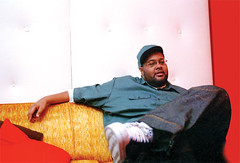The Gift of Gab and Lateef the Truthspeaker

pic by Bayeté Ross-Smith.
story by Mike Conway
Hip-hop is rarely the story of individuals. It’s more often the chronicle of crews. These tight social units come together over time, become family and sometimes emerge as dynasties. Over thirty years and counting and who knows what’s next for hip-hop?
One crew that will give you a good idea is the folks from Quannum collective. They have been hip-hop for well over a decade. And in 2004 Quannum has emerged with guns blazing as both a crew and a recording label LLC.
The crew formed in the early 1990’s, at UC Davis. Known then as the Solesides, the crew consisted of The Gift of Gab and Chief Xcel (collectively Blackalicious), Lateef and Lyrics Born (Latyrx), DJ Shadow, and DJ Zen (aka Jeff Chang). Joyo Velarde is never listed as a part of the crew in the Davis days, but she should be; she studied opera in Rome and influenced the Solesides’ breath control that is their signature rap technique.
Under the Solesides banner, the crew forged a dedicated underground following, with jams like “Deep In the Jungle” (1995), “Burning Hot in Cali...” and “Balcony Beach” (both 1996). The vibe was playful but edgy; lyrically the Solesides blend swift-lipped bravado with graceful word-play, and their production is all about potent, driving beats. In 1998, the Solesides changed their moniker, becoming the Quannum Projects LLC.
As if to show how tight they continue to be, the Quannum crew just finished a road-show last April on a bill titled the Quannum World Tour; it read like a P-Funk All Stars show: The Gift of Gab, Lateef, DJ Chief Xcel, Mr. Lyrics Born and Mrs. Joyo Velarde, DJ D-Sharp, the Lifesavas, and DJ Shadow.
Shadow played what might the hottest deejay item this Xmas: DVD turntables. He dropped visual cuts, and even spun up video alter-egos that did battle raps with the real Lifesavas onstage. He managed six turntables alongside deejays Chief Xcel and D Sharp. Joyo was a one-girl I-Threes. The crowd knew every word to Lyrics Born’s latest album, Later that Day. Lateef, rocking the A’s gear, had the whole hometown crowd waving its hands. And Gab was clearly the head Master of Ceremony.
Every one of them were onstage, in various combinations and all together, tight like DNA. They had no hollow agenda; their message was sincere: Have Fun and Change the Fucking World! It was a live definition of the Quannum collective ethic: you never get just one shining star; it’s always a family affair.
Quannum is an interesting name. Coined by Chief Xcel, it is derived from quantum physics. Physics suggest mind-boggling equations with formidable symbols representing matter and energy. In the Quannum equation, each integer says a lot about the crew’s energetic work ethic.
Take a look at two integral parts of the crew: The Gift of Gab and Lateef the Truthspeaker. They’re the kind of rappers that make you feel sorry for a lot of other emcees. The volume of raps and skills they kick is enough to swell your brain. These two bring an endless range of rhymes that span from battle raps to social commentary to spirituality to some damn good advice; and they do it with a simple clarity, sometimes all in a single song. They’ve worked together on most of Quannum’s projects, and toured together across the world. Each are now driving new projects down uncharted paths. Gab completed his premier solo flight, and Lateef is putting together his first full-length outside of Latyrx.
The Gift launched his solo Fourth Dimensional Rocket Ships Going Up back in May. Gab envisioned this project four years back when he was working with Chief Xcel on Blackalicious’ Nia album. But he’d only found the time to do it over a year ago. In between Blackalicious tours, he would trek to Seattle to develop and record the album with producers Jake One and Vitamin D. Though Gab’s neck-snapping raps may sound familiar, his production team features beats that are laid-back like a late-night discussion between sounds. Fourth Dimensional is Gift of Gab as his own element, apart from Blackalicious. Apart, but not separated: “It’s always healthy in any group to reach out and work with other people as well because that’s how you grow; that’s how you bring back strength to the group,” Gab says.
Meanwhile, Lateef kept Blackalicious deejay Chief Xcel busy in the form of the Maroons; they’ve just released the EP Ambush with a long-player on its way this September. “X don’t like me giving out secrets,” ‘Teef says about the project, “but there’s some EPMD stuff [on it] that’s like Brazilian and you wouldn’t know it unless somebody told you.” Also, Lateef will bust his most overtly political rhymes to-date, building on social commentaries heard on tracks like “The Last Trumpet” and “Kalakuta Show”. But while labelmates Lyrics Born and The Gift of Gab went in more pioneering directions with their solos, the Lateef-and-Chief combo is taking it back the roots of hip-hop for a more classic, “straight-up-the-middle” sound, says Lateef.
It might be hard to imagine exactly what Lateef means by “straight-up-the-middle” until you check the lyrics deacon on stage. Doing his signature track “The Wreckoning”, for example, Lateef definitely keeps one foot firmly in the old school. “The stuff that I do is in keeping with what hip-hop is all about. We’re all really students of this,” says Lateef, fondly recalling how emcee PhD’s like Chuck D and KRS ONE respect his scholarly approach. “It’s really all the appreciation that I need.”
The Truth Speaker sees the same reverence for hip-hop’s origins in much of the music that has emerged from the Bay Area. “One thing about the Bay Area that is unique is over how it has evolved; it was always very open to all kinds of music from all kinds of different places. Of all those differentiations in hip-hop, they all exist right here, within a 100 mile radius.” Bay Area crews have embraced every style hip-hop has given them, and made it new time and again.
Gab concurs. He therefore cautions against using labels divisively: “A lot of times, people get it twisted, like these are the conscious rappers over here and those are the gangster rappers over there. It’s like divide-and-conquer, like because I’m considered a conscious rapper, I’m not supposed to feel 50 Cent. To me, some of the dopest hip-hop ever made was gangster. What makes the music dope is it’s a circle of all different people in life.” Though he may have a different aesthetic than a bona-fide ballaholic like E-40, Gab none-the-less credits E-40’s style as a major influence, on him and all of hip-hop.
Labeling the music of Gift of Gab and Lateef, or the rest of the Quannum ensemble, is especially impractical. Every project they put out defies categories and opens hip-hop wide every time. Labeling music into types can never truly explain the avante-garde. “Because we can’t be packaged in a box,” Lateef says, “that hinders us when it comes to major [media] outlets. Even if the producers enjoy the music, they still have a hard time selling it to venues like MTV... If you’re locked into what media says hip-hop or rap is right now, you might not be able to hear what we’re doing.”
Yet while mass media may have a hard time wrapping their brains around quality independent hip-hop, major record labels won’t hesitate to pick up an underground artist. Blackalicious already signed with MCA for Blazing Arrow, which Gab explains as a “positive experience”. He notes that independent artists struggle to get on the radio and television. But if it’s done right, as was the case with Blazing, partnering with major labels can get artists over that hump to reach a wider audience. Just because artists may be “independent” doesn’t mean they can’t walk on a bigger stage. On Blazing’s track “4000 Miles” Gab explains it in a question: “who said that underground is only just one mode?”
However, while working with majors like MCA can be positive for the artist, the business end can get complicated. Take the example of royalties—the means by which an artist is compensated for their work. As an industry rule, artists are paid 12% of the total album sales in royalties. So if you cut 12 songs on an album, each song adds a point to that 12%. But for a group like Blackalicious, whose projects consistently yield 17+ songs, the value of each song then drops. And once you factor in collaborations with side-artists and sampling, all of which the artist has to pay, royalties become even less majestic. Under that royalty system, an artist has no incentive to do those extra songs, to sample this or that, or to collaborate with him or her.
But that’s where independent labels like Quannum Projects have a leaner advantage; they may have smaller appetites but bigger tables to seat creativity. Lateef puts it this way, “I don’t have to worry about my label flip-floppin around all the time and having that absorb my mental space. I always have a way that I could put out the records that I’m working on.” Together with that freedom, plus the resources Quannum has built as a crew, Lateef can collaborate with whomever on whatever. And at the end of the day, he can rest assured that Quannum has his back.
Creative-friendly environments such as this help to draw a circle of creative friends. That circle is the foundation of any crew worth its battle raps. Crews are a source of strength and support for its members. That support is vital, especially nowadays when the music industry at large is not inclined to develop the artists that they make millions on. Apart from being a very basic affiliation of friends and colleagues, the crew is just a better business model for creative individuals.
But all the complexities of business and media aside, Gift of Gab qualifies the music the Quannum crew creates as something higher: “We’ve been blessed by the opportunity to create, and I feel it’s my responsibility to utilize that blessing to the fullest.”




<< Home